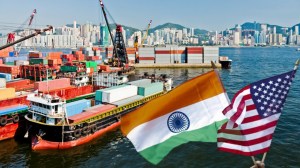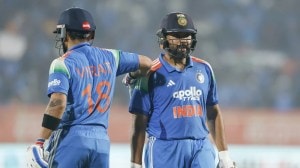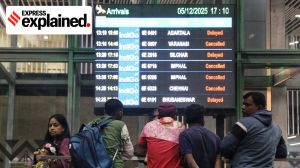‘Democracy is something you have to do… It’s a performance art’
C. Douglas Lummis first went to Okinawa as a US marine. He stayed on in Japan as activist and as teacher of political theory. An erudite and...

C. Douglas Lummis first went to Okinawa as a US marine. He stayed on in Japan as activist and as teacher of political theory. An erudite and independent critic of the politics of universal claims, whether they are made in the name of democracy or of development, he has published extensively in Japanese and English. In 1996 came what many regard to be his most important work, Radical Democracy (Cornell University Press), translated into many languages since.
Professor Lummis has been in India for the last several months as the first occupant of the Rajni Kothari Chair in Democracy instituted by the capital’s Centre for the Study of Developing Societies. He spoke to Vandita Mishra on the hope of a more participatory politics and on the need to begin by calling things by their right name.
What do you mean by radical democracy?
Democracy is self-defining. Demos means the people as a political body, kratia means power or rule. It means a situation in which people have the power or the people rule. But the things that we call democracy — elections, a two-party system, a constitution — these are not the thing itself. They are a means to it. They are, strictly speaking, a hypothesis — if you set up an electoral system the result will be that the people have the power.
Aristotle wrote that in the matter of choosing officials, choosing by lot is the democratic method whereas choosing by election is the aristocratic method. In elections, you choose people who are visible, famous, rich, articulate. But choosing by lot draws in people from all classes. And everyone would feel under obligation to be prepared for possible selection, inducing everyone to think about the public. Choice by lot is not radical democracy itself. I mention it not as a proposal but as a symbol.
Sometimes you have everything political scientists describe as the infrastructure of democracy and real power is skewed towards the so-called power elites. And sometimes the infrastructure of oppression is fully in place and the people produce a situation of radical democracy. We saw it in the Phillipines with the collapse of the Marcos dictatorship and in Eastern Europe.
You have written of ‘‘democratic empire’’, about how the same citizen lives simultaneously in both bodies — the democratic one and the imperial one.
Yes, one of the things I wrote about and that is especially poignant now is that democracy and empire do not sit well together. It requires one sensibility to be a democratic citizen and a completely different quality of mind to be an imperial soldier.
It’s difficult to maintain both frames of mind. What happens is that empire comes home. The cynicism invades the homeland and poisons the democracy. So the US government talks about the respect for Islam but soldiers who go to Iraq call the Iraqis ‘‘rag heads’’, ‘‘sand niggers’’, ‘‘doon coons’’. It’s very difficult to persuade soldiers to carry out a war like that without teaching them racism.
Whenever a country fights a big war, on the average the murder rate goes up domestically by 10 per cent. Certainly, the crime rate in the US rose after Vietnam. Is it because everyone has guns, the family system broke down, people don’t go to church anymore, violence on TV? But one theory’s never in the news: because war comes home.
A public that shrugs these things away cannot be democratic, no matter how beautiful the institutions are. Democracy is something you have to do. It’s not something that’s there. It’s a performance art.
You emphasise the need to rectify names. How does language help?
Calling things by their right name cannot by itself pull people out of cynicism and despair. But it is a way of starting a conversation.
In political science, there’s a great transformation in the use of the word democracy. When the US Constitution was written, none of its authors considered it democratic or considered themselves democrats. They called it a republic. James Madison, the Father of the Constitution, advocated the electoral system on the grounds that under it, no ‘‘mechanics’’ or workers could be elected to the national legislature.
Later in the 19th century, rather than changing the government to fit more of the democratic model, we changed the meaning of the word. Let’s call what we have a democracy. Now the definition was: democracy does not mean rule by the people; rule by the people is not possible; democracy means people have the right to decide which elites will rule them.
This is a change in the definition of democracy in two ways. It no longer means rule by the people. And instead of defining democracy as an ideal to be struggled for and possibly achieved in the future, it defines democracy as the name of what we have. The word democracy loses its critical force.
Can radical democracy be institutionalised?
Strictly speaking, no. But it should be possible to embody that moment in culture, in methods of education. There are ways in which an experience can be passed on from one generation to the next. To say that the danger is not over, it’s not true that now everything is okay.
I was reading through the constituent assembly debates in India and when they come to the right to preventive detention, one debater, Hussain Imam, asks what is this provision doing in our constitution? We in the Congress fought against preventive detention. Another speaker, Pandit Lakshmi Kanta Maitra, responds by saying I have fought against preventive detention, but don’t you understand, this is our government. Things are different now. We need preventive detention for reasons of state.
It’s a very vivid moment, when the democratic spirit is cast away and replaced by the bureaucratic spirit.
In Japan, for instance, the first post-war generation was adamantly against war and resolved never to send its children to the front. They actively supported Article 9 of Japan’s remarkable Peace Constitution which does not recognise the right of belligerency of the state. But it’s been very difficult to pass on that historical memory to the next generation. It becomes an abstract, stereotyped and boring thing.
The Japanese government has always wanted to amend the Constitution to get the power to make war but was prevented so far by public opposition. Now, the opinion polls may be swinging the other way.
- 01
- 02
- 03
- 04
- 05































